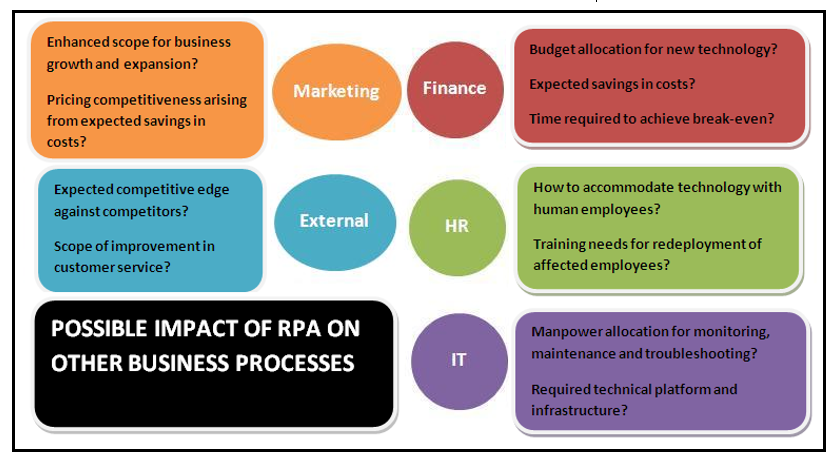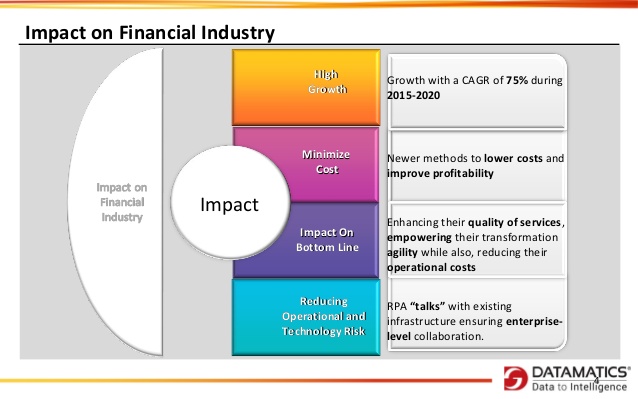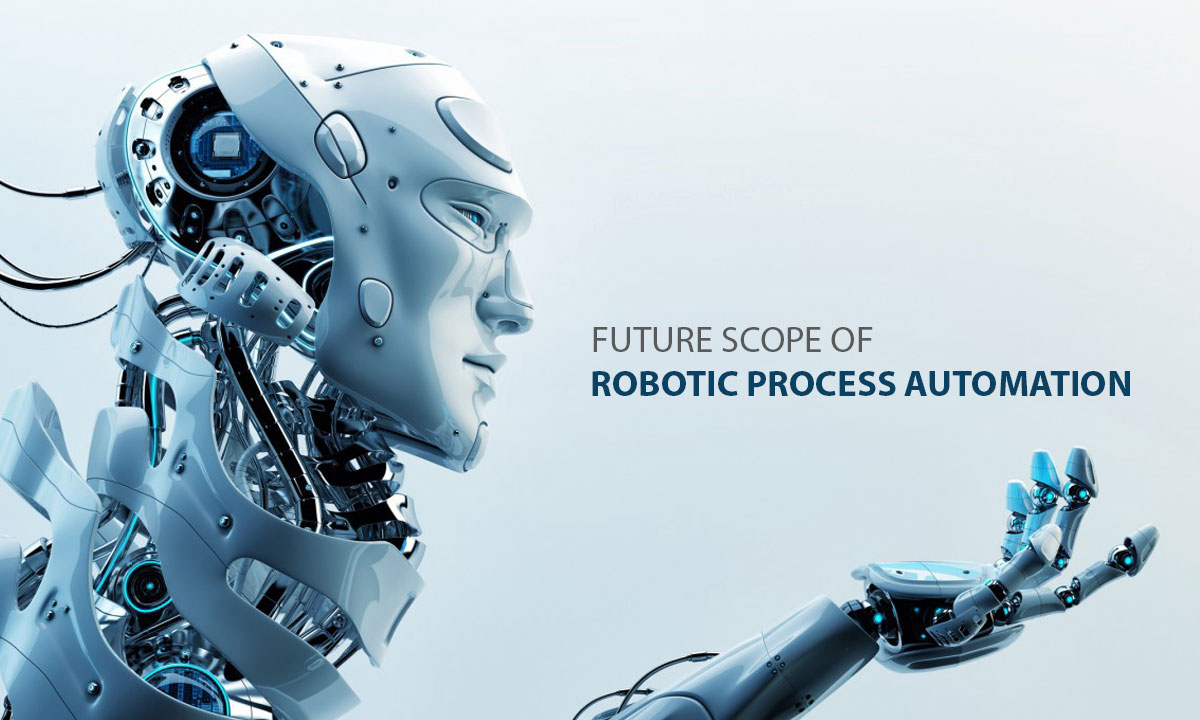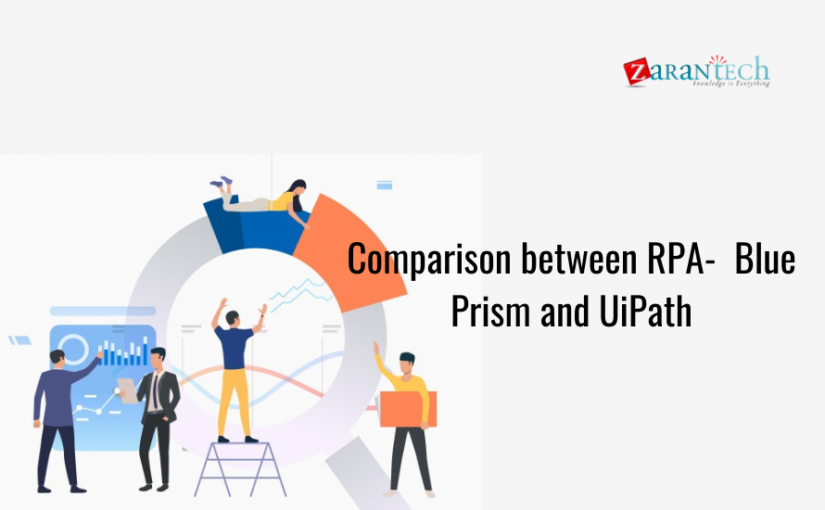Impact of Robotic Process Automation in Business and IT Industry
Category: RPA Posted:May 14, 2018 By: Alvera Anto Automation has changed the face of the business and IT industry; it is playing an important role in various industries. When automation is applied to various activities, the greatest improvement is observed in the business processes. Automation has reduced the human work and the labor cost and increases the reliability and throughput and furthermore enhances the process quality. Automation is successful in almost all the industries such as manufacturing, where it helped in saving the cost by lowering the labor and increasing operational efficiency. Presently, the impact of automation is detected in the IT industry too, specifically in the several back-office support services and other shared services. The Robotic Process Automation i.e. RPA is the most recent technology which is now in demand in most of the organization for their back-office work. RPA works out in the similar manner as the robots are working in the manufacturing industries.
Automation has changed the face of the business and IT industry; it is playing an important role in various industries. When automation is applied to various activities, the greatest improvement is observed in the business processes. Automation has reduced the human work and the labor cost and increases the reliability and throughput and furthermore enhances the process quality. Automation is successful in almost all the industries such as manufacturing, where it helped in saving the cost by lowering the labor and increasing operational efficiency. Presently, the impact of automation is detected in the IT industry too, specifically in the several back-office support services and other shared services. The Robotic Process Automation i.e. RPA is the most recent technology which is now in demand in most of the organization for their back-office work. RPA works out in the similar manner as the robots are working in the manufacturing industries.
The robotic process automation also termed as software automation is now substituting various repetitive jobs and the associated jobs across the business organizations. It is an innovative technology that uses robots, i.e. an automation or the software program to carry out certain repetitive jobs and various corporate procedures with a great accuracy. The RPA turns out to be more dynamic when there are some monotonous tasks exist in the process such as repetitive data record in the similar field, the online access authorization creation of the new user’s, upkeep of the record when the data depends on template and activities are constant. These sorts of processes are easily performed by the robots and therefore human involvement is eliminated.
The RPA has several advantages due to which it is used in most of the industries like it can work all over the year without taking any break, the data can be manipulated and analyzed in an effective and efficient way, which save a lot of time and money. RPA technology is highly accepted in IT service industry to carry out the back-office operations. The RPA is built up in an operating procedure which defines the series of steps which is to be performed by the robots for a specific process. The procedure is converted into the software program via code which is executed by the robots and carries out the different tasks. It controls the system in the similar manner as the humans do in completing the processes. The robots in the RPA imitate the human actions and perform the rule-based task, and therefore it is accepted in most of the industry.
Learn RPA Blue Prism from Industry Experts
There is a great impact of automation in all sections of a business under the IT services. One of the major sections is the back-office operations in which the rule-based and low trained work is in large numbers compared to other sections, where the automation influence is clearly visible. The robots are responsible to carry out all the routine and tedious jobs constantly, in a small amount of time with full correctness. Thus, the working cost is reduced very efficiently and with high productivity, this helps the IT and the business process organizations to enhance their profitability. The back- office labor cost saving ranges from sixty to eighty percent for the subcontracting business and around thirty-three % of the total cost of the offshore employees.
The huge up and down can be observed in RPA with response to the regular and constantly changing necessities of the organization with a comparable level of accuracy. The robots can work restlessly throughout the year without any break. Due to the automation, the BPO service providers handle their customer in a more efficient and responsible manner which offers them the best customer services. The robotic process automation provides support for solid logical capacity, which helps in maintaining the transparency and evaluating the process and also supports for local authorities which not permits for data transfer from the alternate nations.
The BPO industry with the assistance of RPA, is now able to emphases on high-value processes as the other lower end processes are now taken care by the robots. It is easy to integrate the RPA with the other service solutions and offerings from the IT service companies. They are accepted in the field of IT support help desk, data center and server support, network support, and other IT infrastructure maintenance area except testing. The robots can provide the services like data entry and data transfer from legacy system to Enterprise Resource Planning (ERP). The RPA can be organized with any of the processes, regardless of the industry or function, it is only important to realize the process which is to be defined and rehashed without any judgement. RPA has already started to show its impact on the BPO industry and this will continue in the upcoming years with more technological advancements. The RPA technology is accepted by most of the service providers aggressively, but some of the service providers can protect themselves.
Some time using RPA technology the business may result in redundancy, that is the reason most of the service providers won’t choose this solution. The BPO industry is providing the services for about one million experts and if the RPA is utilized as a part of the BPO industry than it could take over around 20 to 40 % of the processes, which will influence the job situation. The automation can replace the jobs and affect the financial plan. When a new technology has accepted in an industry, there should be someone to host the new job opportunities such as the special knowledge people are required to organize and manage the robotic team, that continually enhances the performance of robots. In order to ensure this, the uprooted workers should encourage to accept the emerging technology quickly and gain the new skill sets. It is not possible to automate all the process, it depends on selecting the correct person that is suitable for automation to automate a particular process. The employees can look after the other task if a small portion of their task is automated, which may also result in employee fulfillment. Thus, there should be a legitimate technique to accept the automation technology.
The RPA technology is utilized by many organizations to carry out various functions such as data entry and authentication, text removal, downloading and importing, uploading and exporting, workflow acceleration, currency and exchange rate processing, reconciliations, web scraping, UI manipulation, file and data handling. The reason behind accepting the RPA technology is that, as the robots can emulate the user’s activities and carry out the rule-based tasks, the IT department no longer is required. In this manner, we can state that RPA is the software which can work with the alternate applications using GUIs.
The Impact of RPA on other industries: The robotic process automation technology has not only influenced the IT and BPO industries, but there are several other industries such as the automotive, finance, and the telecom industry, and marketing where the effect of RPA can be observed.

In the automotive industry, the RPA permits the manufacturers to reorganize the back-office tasks and ease the managerial processes, which has offered ascend to the agiler back office.
This could be possible because of the various reasons:
1. RPA improves the regulatory compliance.
2. It offers real-time monitoring and investigation.
3. With RPA, it is possible to digitized communication.
4. The RPA has the capacity to connect the digital platforms with paper.
RPA also controls the compliance for financial services: RPA solution provides the regulatory compliance by executing the functions in the similar way repeatedly and provide a detailed and workable report of the activities, which is a basic requirement for the compliance. RPA tools can also be learned and scaled easily to perform new processes because they are announced by the regulatory organizations.
RPA’s impact in the telecom industry: RPA in the telecom industry provides a way to restructure the business procedures and handle the various problems. With the help of RPA the telecom companies are able to manage their back-office tasks effectively and can deal with a large volume of the repetitive task and rule-based operational processes. The telecom providers need to shift the circuits as per the client drive.
RPA’s impact in loan processing and other banking processes: Due to RPA tools rule-based tasks feature, it provides increased and correct loan processing practice. The errors can be solved and speed can be increased for the loan system by applying the rule-based algorithms. Not only this, with RPA, it is possible to analyze the data in the application and possible for sale the other products to the clients like insurance, etc. With RPA, it is easy to carry out various back-office task in the bank processes. It improves the efficiency in business processes by providing a cost-effective method to the human resources. The various features of RPA in banking are,it is possible to carry out the process execution 24 by 7, it lower the cost and removes the errors due to human involvement.

Learn RPA UiPath from Industry Experts
Conclusion:
The RPA technology is beneficial to the IT services and Business industries and shows a positive impact on them in terms of cost, revenue, and operational efficiency. The work of labor can be reduced by reallocation and redistribution of human capital. Not only this the automation will constantly change the plan of action and the conveyance model in IT, especially in the BPO services. The impact of RPA is not limited upto IT and business process services, but its influence is observed across many industries which is still continuing.





 99999999 (Toll Free)
99999999 (Toll Free)  +91 9999999
+91 9999999